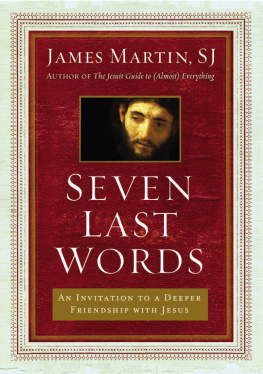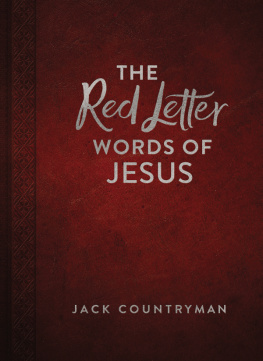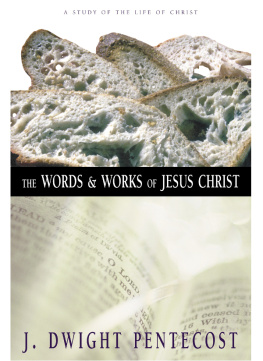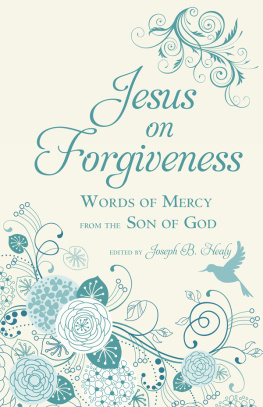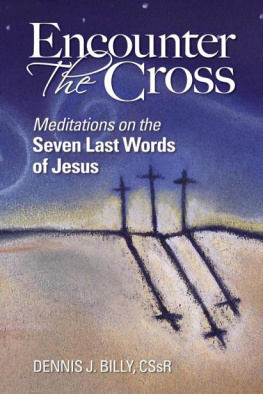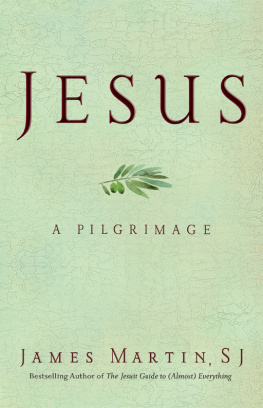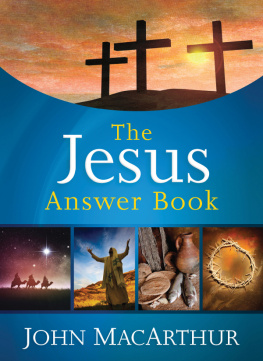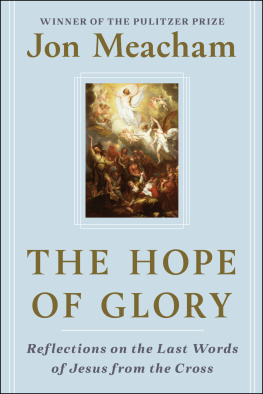At the time of this writing, St. Patricks Cathedral is undergoing its first full-fledged restoration and renovation since its construction in 1858. As I sat in the cathedral on Good Friday in the midst of this physical renewal of our beloved cathedral, I listened to Father Martins reflections on the Lords Seven Last Words, grateful for the spiritual renewal he was bringing to the faithful assembled in prayer on this most solemn day of the church year.
I trust you will find these reflections as spiritually rewarding and uplifting as I.
W hen I mentioned to a friend that I had been invited to preach the Seven Last Words at St. Patricks Cathedral in New York City, her reaction was not surprising: The seven last what?
Although prayer services centering on the Seven Last Words began, by some accounts, as early as the sixteenth century, many devout Christians are not familiar with the tradition. So a little background may be in order.
The Seven Last Words are the seven last sentences, or phrases, or sayings, uttered by Jesus as he hung on the cross on Good Friday, at least as recorded in the Gospels. (There may have been others that were not recorded.)
Traditionally, they are ordered as follows:
Father, forgive them; for they do not know what they are doing. (Luke 23:34)
Truly I tell you, today you will be with me in Paradise. (Luke 23:43)
My God, my God, why have you forsaken me? (Mark 15:34; Matthew 27:46)
Woman, here is your son.... Here is your mother. (John 19:2627)
Father, into your hands I commend my spirit. (Luke 23:46)
I am thirsty. (John 19:28)
It is finished. (John 19:30)
A quick glance at that list shows that Jesus speaks one time in the Gospels of Matthew and Mark, three times in Luke, and three times in John. So the first question people often ask about the Seven Last Words is: Given the importance of these utterances, why doesnt each phrase appear in every Gospel? Indeed, if we treat Matthew and Mark as a unity (since Matthew probably drew upon Marks Gospel), no saying in any of the Gospels appears in the others. Why not?
To answer that, its helpful to understand something about the New Testament. So let me offer a brief prcis of the development of the Gospels.
The writing of the Gospels took place in several stages. But there was no need for books when you had eyewitnesses. Besides, many of the early disciples could neither read nor write.
Even at this early stage, you can see the likelihood that differences would arise among the various oral traditions. To begin with, not all eyewitnesses would describe an event in precisely the same way. Each would stress one thing or another, depending on what each deemed important. Already we can see how variations could creep into the story of Jesus, which helps to answer the question of why the Gospels dont always agree with one another and, in this case, why all of the Seven Last Words arent included in every Gospel.
After the original witnesses died (and it became clear that Jesus would not, as some expected, return soon), the next stage began. This required the editorial work of those who compiled the Gospels for the early church, known as the evangelists: Matthew, Mark, Luke, and John.
Each evangelist wrote for a different audience and so stressed different parts of the story, perhaps leaving out what another writer would deem important or adding passages that another writer would consider less significant. This also helps to explain the selection of some of Jesuss sayings from the cross and the omission of others. Moreover, some of the sayings of Jesus from the cross may have been known to one evangelist, but perhaps not to the others.
Three of the GospelsMatthew, Mark and Lukeare intertwined. Although there are competing theories about how they are connected, it is clear that they are. Most scholars think that Marks Gospel came first and that the evangelist wrote to a non-Jewish community around 70 AD. Matthews Gospel, written around 85 or 90 and addressed to a primarily Jewish audience, is an expanded and revised version of Mark, supplemented with other stories. Luke, though likely a Gentile (or non-Jew), nonetheless knew something about Jewish traditions when he wrote his Gospel around the same time as Matthew; he also drew on Mark and supplemented his narrative with other stories. Both Matthew and Luke also relied heavily on an independent source of sayings.
Although Matthew, Mark, and Luke edited their books to address specific communities of readers, their Gospels are so similar that they are referred to as the Synoptic Gospels, because they include numerous passages that can be looked at together. (The Greek syn-opsis means, roughly, see together.)
The Gospel of John, written later, most likely for Christians in the eastern Mediterranean area in the late first century, is noticeably different from the Synoptics. Johns narrative, for example, introduces several characters who do not appear at all in the other three Gospels, including Nicodemus, the man born blind, the Samaritan woman, and Lazarus. In fact, few of the episodes of Jesuss public ministry recorded in John mirror those in the Synoptics.
Thus, its easy to see why the Seven Last Words might vary from Gospel to Gospel. These phrases, then, represent not only Jesuss final thoughts on the cross (at least as recorded in the Gospels), but also what the original communities for which the evangelists wrote considered to be the most important sayings. So the Seven Last Words are important for understanding not only Jesus, but also the early church.
Now that we know a little about the Gospels, where did the tradition of worship services centered on the Seven Last Words arise?
Thats harder to explain. As early as the second century, there were attempts to order the Seven Last Words to give them some coherence. Some scholars, as I mentioned, date liturgical ceremonies that center on the sayings as far back as the sixteenth century, but it is difficult to pinpoint their origins with precision. Today, at the very least, we can say that the current practice extends throughout churches in various Christian denominations and is usually a part of the Good Friday service in a cathedral or church. Composers have also used the Seven Last Words as settings for chorale pieces. Normally, the liturgies of the Seven Last Words include some combination of prayer, music, and reflections.
Most churches choose seven different speakers, sometimes from various Christian denominations, each of whom reflects on one of the sayings. In the Jesuit church in New York where I often celebrate Mass, the pastor usually invites Episcopal priests (both men and women), Baptist pastors, Lutheran clergy, members of Catholic religious orders, and laypeople from various walks of life for a wide variety of perspectives on Good Friday. In my case, Cardinal Timothy Dolan, the archbishop of New York, asked me to be the sole presenter, which prompted more than a few Jesuits to exclaim, with no little concern for the parishioners at St. Patricks, All seven? Just you?
If there is an overarching theme in my own reflections, it is the way that Jesuss sufferings help him to understand us. Few insights have been as important in my own life and in the lives of people who come to me for spiritual direction and pastoral counseling. The person to whom we pray, the man we hope to follow, the one who is risen from the dead,

